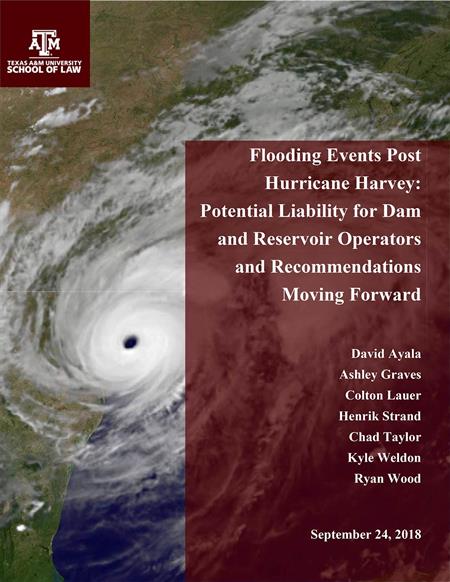FLOODING EVENTS POST HURRICANE HARVEY: POTENTIAL LIABILITY FOR DAM AND RESERVOIR OPERATORS AND RECOMMENDATIONS MOVING FORWARD
Project Directors:
Gabriel Eckstein, Professor, Texas A&M University School of Law
Howard S. Slobodin, Adjunct Professor, Texas A&M University School of Law; General Counsel, Trinity River Authority of Texas
Authors:
David Ayala, Ashley Graves, Colton Lauer, Henrik Strand, Chad Taylor, Kyle Weldon, Ryan Wood
 When Hurricane Harvey hit the Texas coast as a category 4 hurricane on August 25, 2017, it caused $125 billion in damage, rivaling only Hurricane Katrina in the amount of damage caused. It also resulted in the deaths of 88 people and destroyed or damaged 135,000 homes. Much of that devastation was caused by flooding. The potential liability that dam and reservoir operators may face for decisions they make during storm and flooding events has now become a major concern for Texas citizens and its elected officials. Law suits have now been instituted against the federal government for their operation of two flood control reservoirs, as well as against the San Jacinto River Authority for its operation of a water supply reservoir. Moreover, the issues and concerns have been placed on the agenda of a number of committees preparing for the 2019 Texas legislative session.
When Hurricane Harvey hit the Texas coast as a category 4 hurricane on August 25, 2017, it caused $125 billion in damage, rivaling only Hurricane Katrina in the amount of damage caused. It also resulted in the deaths of 88 people and destroyed or damaged 135,000 homes. Much of that devastation was caused by flooding. The potential liability that dam and reservoir operators may face for decisions they make during storm and flooding events has now become a major concern for Texas citizens and its elected officials. Law suits have now been instituted against the federal government for their operation of two flood control reservoirs, as well as against the San Jacinto River Authority for its operation of a water supply reservoir. Moreover, the issues and concerns have been placed on the agenda of a number of committees preparing for the 2019 Texas legislative session.
This report reviews current dam and reservoir operations in Texas and examines the potential liability that such operators may face for actions and decisions taken in response to storm and flooding events. The report also offers recommendations for best practices for dam operators, including flooding notifications and building community relations, as a mean to engage and educate the public and thereby reduce the potential for disputes and litigation
The report is the work product of students enrolled in the Natural Resources Systems Capstone Seminar at Texas A&M University School of Law under the supervision of Gabriel Eckstein, Professor of Law and Director of the Texas A&M University Law Energy, Environmental, and Natural Resource Systems Law Program, and Howard S. Slobodin, Adjunct Professor of Law and General Counsel of the Trinity River Authority of Texas.
- To download the report, please click here or on the report image.
Please note: Since the completion of principal work on this report, one case it addresses was reversed on appeal. St. Bernard Parish Government v. United States, 121 Fed. Cl. 687 (2015) (finding plaintiffs proved a taking arising from the United States Army Corps of Engineers failure to maintain infrastructure that caused increased flooding to the plaintiffs’ properties), rev’d 887 F.3d 1354 (2018). The Federal Circuit reversed that decision on the basis that government inaction, the alleged failure to properly maintain Mississippi River-Gulf Outlet channel, could not give rise to takings liability. The reversal of the lower court’s ruling does not affect this report’s treatment of the issue of a required investment-backed expectation as an element of a flooding-based federal constitutional inverse condemnation claim.